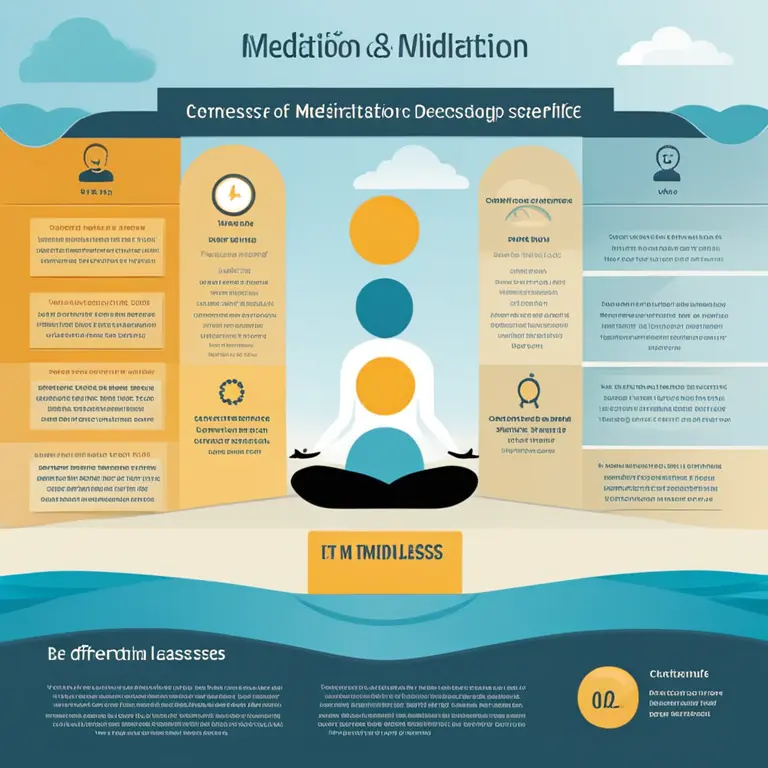
Can Meditation Aid in Alleviating Depression?
Discover the benefits and potential of meditation as an aid in managing and reducing symptoms of depression.
article by Hina Kurosawa
Mental Health and Meditation
In recent years, the mental health community has increasingly turned to meditation as a potential complementary treatment for depression. With the rise of mindfulness practices and their integration into therapeutic contexts, the once-esoteric practice of meditation has gained substantial credibility. In a fast-paced world, where mental health has become a global priority, meditation offers a respite, a moment of stillness that could be transformative. Researchers are actively investigating its efficacy, and findings suggest that this ancient practice may indeed harbor benefits for those struggling with depressive symptoms.

Understanding Meditation's Mechanisms
Meditation is not a one-size-fits-all remedy, and it comes in various forms such as mindfulness meditation, transcendental meditation, and guided imagery, among others. Each type aims to bring about a state of mental clarity and emotional calmness. By focusing on the present moment or engaging in repetitive mantras, individuals can potentially interrupt the cycle of ruminative thoughts often associated with depression. The practice encourages awareness and self-regulation, two skills that are vital in managing depressive episodes appropriately.

Clinical Studies and Findings
Evidence from clinical studies bolsters the case for meditation as a supportive treatment for depression. Clinical trials have demonstrated that regular meditation can significantly reduce the symptoms of depression, often with effects comparable to standard therapeutic interventions. Mindfulness-Based Cognitive Therapy (MBCT), which incorporates meditation, has been recognized for its effectiveness in preventing relapse in individuals who have experienced multiple depressive episodes.

Integrating Meditation into Daily Life
For meditation to be effective in managing depression, it needs to be practiced consistently. It's not just about the duration of each meditation session, but the regularity with which it is incorporated into one's lifestyle. Starting with a few minutes each day and gradually increasing the duration can make this practice more approachable for beginners. There are numerous apps, online programs, and community classes available in 2024 that can guide individuals through the process and help them make meditation a staple in their lives.

Meditation's Role Alongside Traditional Therapy
It is essential to note that meditation should not replace conventional treatment methods for depression, such as medication and talk therapy. Instead, it should be considered an adjunct, providing an additional tool in the arsenal against depressive symptoms. Healthcare professionals often recommend meditation as part of a comprehensive treatment plan, which might also include lifestyle changes, nutrition, exercise, and social support.
Limitations and Considerations
While meditation has its advantages, it is not without limitations. Not everyone may find meditation helpful, and it can occasionally lead to increased anxiety or rumination in some individuals. It is crucial to approach meditation with a personalized and cautious perspective, and those with severe depression should always consult mental health professionals before embarking on a meditation practice. Furthermore, the landscape of mental health interventions continues to evolve, and meditation's place within it may shift as new research and treatments emerge.
Conclusion: Meditation's Prospects
Meditation holds promise as a beneficial addition to the management of depression. Emphasizing mental wellness and self-awareness, meditation can help forge a path towards recovery and resilience. As research continues to expand our understanding of its mechanisms and efficacy, individuals with depression may find solace and empowerment in this timeless practice. Ultimately, incorporating meditation into a holistic approach to mental health care could yield significant improvements in the lives of those affected by depression.
Published: 1/14/2024
Modified: 1/15/2024
More predictions
Come back here soon to learn more about yourself and your future


Calming the Storm: Mindfulness Meditation for Anger
Discover how mindfulness meditation can be a powerful tool for anger management, promoting inner peace and emotional balance.


Easing Loneliness with Meditation
Discover how mindfulness meditation can provide solace and connection to mitigate feelings of loneliness, enhancing emotional and mental well-being.


Mindfulness Meditation Basics for First Graders
Introducing foundational mindfulness meditation practices to instill calm and focus in first-grade students.